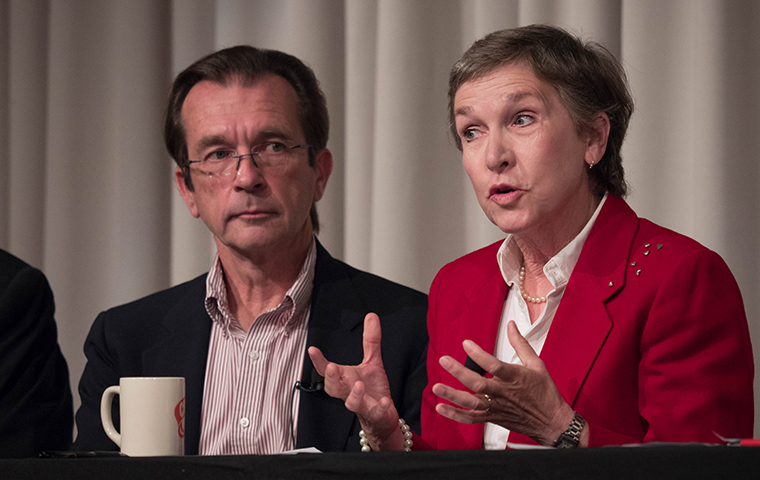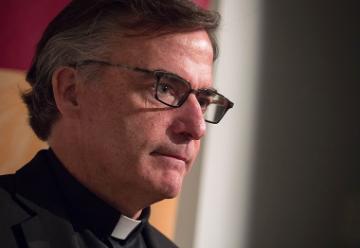
‘Speak the Truth’
SCU panel discusses the catastrophe of clergy sexual abuse.
As furor over the clergy sex abuse crisis continues—with some calling it the greatest challenge to the Catholic Church since the Reformation—a panel of two priests and two academics at Santa Clara University on Tuesday addressed both the controversy and meaningful reform, urging the church to embrace significant change and transparency in order to thrive.
“Like a modern-day Pieta, the body of Christ is broken, and it needs to be healed,’’ Kevin O’Brien, S.J., dean of SCU’s Jesuit School of Theology, told an audience of about 150 attending the discussion at de Saisset Museum on Tuesday.
“This requires some courage for us,’’ said O’Brien. “It emboldens us to speak the truth.’’

The panel was convened by the Markkula Center for Applied Ethics, Campus Ministry, and Ignatian Center for Jesuit Education, as a way for Santa Clara University to discuss ideas for reform after a series of clergy sex abuse scandals, many dating back decades, surfaced over the summer and reignited outrage and old wounds.
It also came at a time when dioceses—including San Jose and Oakland—are launching investigations and vowing to be proactively transparent in naming priests who have been credibly accused in the past.
Both personal, and pastoral
Fr. Brendan McGuire, pastor of Holy Spirit church and an administrative leader in the Diocese of San Jose, only recently revealed that he himself had been a victim of abuse as a teen. He spoke about the experience at the panel.
“Today I come before you not only speaking for victims, but I speak to you as a victim myself,’’ he told the audience.
His abuser was a mentor as McGuire pursued his path to priesthood, adding levels to the betrayal. The priest spent over four years grooming him “for his final play,’’ he said, attacking the 18-year-old McGuire, who was able to escape.
But the shame was so great that until last month he’d never told anyone about the incident. He later discovered the priest had preyed on dozens of young men in New Hampshire and Massachusetts, and was sent to prison in 2004, where he died two years later.
“There are so many worse off than me,’’ McGuire acknowledged. “I was one of the lucky ones who got away.’’
He shared a list of suggestions for those who are both leaders and potential counselors to victims, as well as families and friends of victims. McGuire calls it LASO: Listen; Acknowledge the pain; Share the suffering; Offer prayers of support.
To bishops, he said: “Please tell the whole truth. Please don’t ask victims to go to court to get the truth, to sue. ... Don’t wait for another state attorney (general) to force us—this slows everything about abuse in the church.’’
He also entreated them to work with the Pope to reform the governance of the church.
“Women should have a voice in the authority within the Church,’’ he said. “I do not believe for a moment that the travesty of justice would have happened if mothers and fathers were decision makers at the table.’’
Fellow panelist and SCU religious studies lecturer Sally Vance Trembath, attributed the church’s prevalence of abuse to “a staffing crisis’’ at parishes and a “deceit crisis’’ by the clergy.
“Too many people who staff the church are either untrained, incompetent, or using a position funded by the institutional church to serve some other agenda,’’ she said. “The institutional bureaucracy has failed.’’
Panelist and SCU psychology professor Tom Plante, who has spent 30 years researching clergy sexual abuse, acknowledged the pain of those who have been victimized by clergy. But he noted that significant reforms have been in place for almost two decades, involving best practices like lay review boards for every diocese and religious order. Those boards review all cases of reported clerical problem behavior. And there is zero tolerance for abuse.

Tom Plante interviewed by NBC television crew
As a result, he said, since 2002, the number of new cases of clergy sexual abuse (in the U.S.) “is very low,’’ usually fewer than 10 each year. And about half of those cases are linked to international priests in the U.S. who were not trained or screened as American clerics are.
“There is good quality, empirical data on sex offendings, and there are good best practices in protecting children that are available and used by many organizations,’’ said Plante.
But, he added, “Sadly and tragically, any time you put men with children and teens, a certain percentage of them will violate that trust and exploit that relationship.’’
Better Training, Structural Reform, Greater Accountability
O’Brien talked about the need for structural reform within the church that would add greater accountability and transparency.
For example, he said at SCU’s Jesuit School of Theology, candidates for priesthood study with lay men and women together in the same classroom, taught by Jesuits as well as lay people, “in the midst of Berkeley, California—not in some hills separated from the world.”
Re-thinking the appointment of bishops and how that is done in the U.S. is another consideration, he added.
The latest reports of clerical abuse took O’Brien back almost two decades to 2003 when he was living in Boston, “ground zero for the church scandal at that time,’’ he said.
It was the same period that O’Brien was seeking to be ordained as a priest, and he remembers asking himself: “‘Into what church am I being ordained? … Do I stay or do I go?’’’
A Jesuit superior told him the challenge facing the church was similar to the Virgin Mary holding the broken body of the crucified Jesus in her her arms. The body needs to be healed, the superior told him, and more than ever, he said, the church was depending upon people like O’Brien for help.
He prays that young Catholics especially will keep their faith, as he did those many years ago.
“What I want to say to them is what was told to me: we need you, desperately; we need your different vision and we need your different perspectives, and we need your way of thinking,’’ O’Brien said.
“We need your enthusiasm, and God knows we need your forgiveness. But we need you.’’